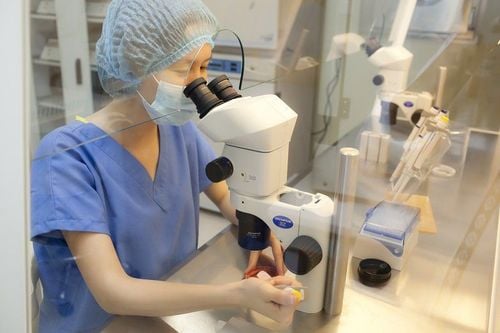This is an automatically translated article.
The article is professionally consulted by Master, Doctor Nguyen Van Thanh - Department of Obstetrics and Gynecology - Vinmec Nha Trang International HospitalFallopian tubes are very small, so they can be easily blocked. Blocked fallopian tubes prevent the ovulated egg from traveling through the fallopian tube to the uterus, and sperm from the vagina into the uterus cannot reach the fallopian tube for fertilization. This is one of the causes of infertility - infertility in women.
1. What is tubal occlusion?
The fallopian tube is the tube that carries the egg from the ovary to the uterus. The length of the fallopian tube is about 10cm, divided into 4 segments: the interstitial, the isthmus, the bulb, and the oviduct. Each segment has a different function. The two fallopian tubes on either side of the uterus create a path and help the egg move more easily. Blocked fallopian tubes occur when the fallopian tubes are narrow, making it impossible for an egg to travel down to the uterus to meet sperm, directly affecting the ability to conceive. Blocked fallopian tubes can lead to ectopic pregnancy (incomplete blockage), infertility, or infertility (complete blockage).Causes of blocked fallopian tubes include: appendicitis, endometriosis, pelvic inflammatory disease, repeated abortions or birth defects...
2. Can blocked fallopian tubes get pregnant?
In order to get pregnant with blocked fallopian tubes, depending on your medical condition, you will be consulted by an obstetrician-gynecologist with one of the following measures:Medical: In case of mild tubal obstruction due to tubal inflammation you have can be treated medically with anti-inflammatory drugs.
Surgery : In case the drug treatment is not effective, the obstetrician-gynecologist will advise you one of the surgical measures such as:
Unblocking the fallopian tube with an air pump; Laparoscopic fallopian tube surgery: During the surgery, the doctor places the laparoscope into the uterine cavity and uses a specialized instrument into the fallopian tube, pushing the obstruction out, separating the adhesions; Surgery to cut and connect the fallopian tubes: In case the fallopian tube is blocked in one segment and cannot be opened, the doctor will remove the blocked segment, then connect the two non-obstructed segments together; Tubal removal surgery: When the methods of catheterization are not effective, there is no hope of natural conception, you will be advised by your doctor to cut your fallopian tubes to perform artificial insemination with a high success rate. . The surgical methods to unclog fallopian tubes are quite popular, but they do not guarantee 100% success because the fallopian tubes are very small, and it is difficult for instruments to unclog the blocked segments for a long time. Therefore, you should examine and perform treatment at reputable obstetrics and gynecology hospitals and highly skilled doctors. In case of failure of fallopian tube surgery, it is mandatory to switch to artificial insemination or in vitro fertilization.
3. Is it possible to have artificial insemination with blocked fallopian tubes?

In case both fallopian tubes are blocked, you will be assigned to do in vitro fertilization according to one of the following methods:
Normal embryo transfer if the two fallopian tubes are blocked near the waist or the interstitium close to the uterus. Tubalectomy followed by transfer of previously frozen embryos in the case of large tubal fluid retention in the tubal lobe. In case the patient has many embryos, the situation of fluid retention is not much, the doctor will conduct embryo transfer, if the pregnancy is not successful, surgery will be carried out. To know exactly if blocked fallopian tubes can be artificially inseminated, you should go to the hospital for examination to properly determine your condition, from which appropriate treatment measures can be taken.
Recommended video:
Is embryo transfer painful?
4. How to prevent blocked fallopian tubes?

Vinmec IVF Reproductive Center is the address of infertility - infertility treatment chosen by many couples. Up to now, the Center has performed fertility support for over 1000 infertile couples with clinical pregnancy rates ranging from 45% to 50%.
The world's leading advanced assisted reproductive technology with high efficiency: Using advanced techniques in assisted reproduction helps people with poor sperm quality still be able to have children, reducing the rate of genetic abnormalities In embryos on day 5, immunological evaluation of the uterine lining helps patients with multiple implantation failures have a higher chance of success, accurate embryo genetic screening and diagnosis, and reduce the rate of multiple pregnancies and stop pregnancy. The success rate is from 45%-50%, this rate is equivalent to developed countries such as UK, USA, Australia. 1000 babies were born from IVF at Vinmec. Comprehensive - professional care service: As the leading modern center in Vietnam, applying a treatment process that coordinates comprehensive examination, combining both male and female obstetrics and gynecology to offer the optimal plan for each patient. case. Comprehensive care from infancy to adulthood. Private examination space, customers are consulted and guided specifically and fully by experts. Well-trained and experienced staff: The team of doctors are leading experts in the field of obstetrics and gynecology in the country and internationally, trained at famous fertility centers around the world. world. With a high level of expertise and extensive experience, IVF's staff is capable of synchronously and comprehensively deploying the most advanced assisted reproductive techniques today, helping to realize the dream of becoming a parent. of hundreds of families across Vietnam. System of facilities and modern equipment: Ensure the best embryo culture conditions such as: clean room system level I international standard ISO 14644-1; The culture room is designed with one-way, positive pressure blowing clean air and the culture cabinet system has many separate culture chambers equipped with a time-lapse camera inside the cabinet without disturbing the culture conditions..
Please dial HOTLINE for more information or register for an appointment HERE. Download MyVinmec app to make appointments faster and to manage your bookings easily.
Recommended video:
How does in vitro fertilization work?














